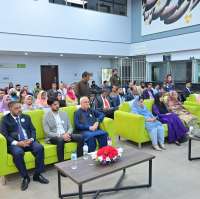WIDE RANGE OF CAREER CHOICES
Electrical engineering is a practical discipline with a plethora of great career opportunities. Electrical and electronics engineers can work in research and development industries, engineering services firms, manufacturing, government, and tech. Relevant industries include automotive manufacturing, aerospace, defence, consumer electronics, commercial construction, computing, and telecommunications.
TO BECOME FOREFRONT OF FUTURE TECHNOLOGIES
Electrical engineers require an in-depth understanding of electrical and electronic theory, mathematics, and materials. They also need advanced computer skills, and coding knowledge is a huge advantage. Electrical engineers are increasingly relying on computer-aided design (CAD) systems for testing and research. Computer simulations can model giant national power grids, run war games against a new radar or defence system, or test the processing speed of microchips.
Essentially, electrical engineers are problem solvers and innovators. They're always looking to improve output and efficiency. As such, they tend to be analytic thinkers who take a systematic approach. However, there's still plenty of room for imagination and flair in electrical engineering. Those who can combine the practical approach with novel ways of thinking tend to be the most successful and influential engineers.
And they can do some genuinely amazing things that transform the way we see ourselves and the world. Generally regarded as the greatest electrical engineer of all time, Nikola Tesla believed engineering was much more than just a 'science'. He saw it as a humanist project that can build a fairer and more sustainable world. "All people everywhere should have free energy sources," wrote Tesla in 1900. "Electric power is everywhere present in unlimited quantities and can drive the world's machinery without the need for coal, oil, or gas."
TO CONTRIBUTE TO THE SOCIETY
Despite the global economic uncertainty caused by the outbreak of COVID-19, the future looks bright for Electrical engineers. In fact, they will play a central role in developing and testing the smart technologies and infrastructure set to power the global recovery. The US Bureau of Labor Statistics (BLS) predicts that demand for electrical engineers will grow by almost 5% within the next 12 months and exponentially over the coming decade. "The rapid pace of technological innovation and development will likely drive demand for electrical and electronics engineers in research and development, an area in which engineering expertise will be needed to develop distribution systems related to new technologies," according to the BLS. Electrical engineers are also at the forefront of the most exciting developments in science and technology, including wireless neuro-links that could help stroke victims regain motor function.










